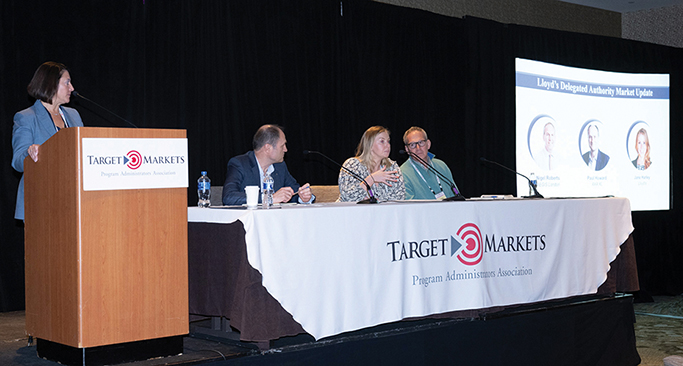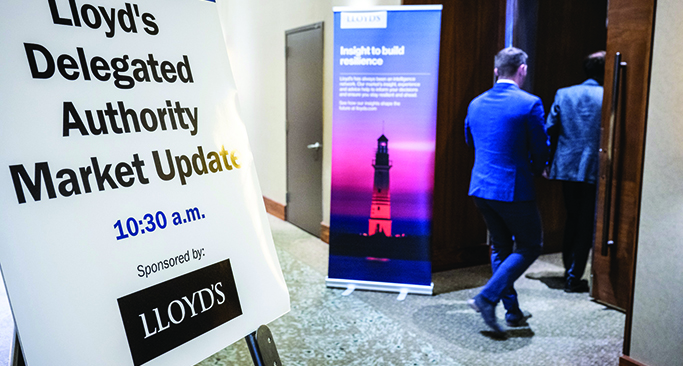LLOYD’S MARKET UPDATE
Program administrators learn status and outlook for delegated authority
By Elisabeth Boone, CPCU
With its beginnings in a London coffee shop in the 1680s, Lloyd’s is a leading marketplace for commercial, corporate, and specialty risk solutions, sharing risk across everything from cargo holds to climate change to space exploration to cyberattacks.
Earlier this year, Target Markets Program Administrators Association hosted a panel presentation titled “Lloyd’s Delegated Authority Market Update.”
Moderated by Lloyd’s Market Development Director Dawnmarie Black, panelists were Jane Harley, head of delegated authorities for Lloyd’s; Paul Howard, head of coverholder and alternative distribution at AXA XL; and Nigel Roberts, chair of the Lloyd’s Market Association’s delegated authorities committee.
The session led off with a discussion of capacity at Lloyd’s and how it has changed over time. “Our current capacity is around $60 billion, with year over year growth of about 21%,” Harley explained. “It’s fairly split between open market business and delegated authority business … .”
Following up, Black asked Harley how Lloyd’s financials have shaped up and what the outlook is for 2023. “Over the last year we’ve had a really strong underwriting result—about $2.6 billion,” Harley said. “In 2021, we had a $1.7 billion underwriting result. So, we’ve seen strong performance over the last couple of years, even when you take into account what’s been going on in the world.”

“My thoughts on delegated
authority are that it’s only going to go one
way, and that’s up.”
—Nigel Roberts
Chair
Lloyd’s Market Association’s Delegated Authorities Committee
Observing that this sets the stage for 2023 being an exciting year, Black asked Harley to talk about other developments she’s seeing as Lloyd’s moves forward. “If we look at the last five years, from a delegated authority perspective, we’ve grown from around 35% of U.S. businesses to just about 40%,” Harley explained. “We’re planning right now to grow that to about 60 billion pounds of premium.
“One of the ways we are shaping Lloyd’s as a dynamic marketplace is by means of initiatives like the Lloyd’s Lab,” she said. The Lloyd’s Lab is an insurtech accelerator program designed to help innovative ideas gain traction and success in the market.

“One of the ways we are
shaping Lloyd’s as a dynamic marketplace is by means of initiatives like the Lloyd’s Lab.”
—Jane Harley
Head of Delegated Authorities
Lloyd’s
“How do we create innovative products and facilitate conversations and look at different ways of working in 2023 and beyond?” Harley added. “That’s a key priority for us.”
“My thoughts on delegated authority are that it’s only going to go one way, and that’s up,” said Roberts. “The key focus of the work I’m doing is to make it easier for people to do business with Lloyd’s. So rather than us telling them that this is the way we want to do business, we’re asking people how they’d like to do it.
“What is the marketplace of the future going to be?,” he added. “Our ultimate goal is to bring more profitable business to the Lloyd’s marketplace, and for people to be able to offer more choice to their customers.”
Black then put a question to all panelists: “In terms of the ecosystem at Lloyd’s, each of you plays a different role,” she said. “So, Jane with a corporation, Nigel with LMA and Aegis, and Paul with a carrier or syndicate, could you talk about your roles within that ecosystem and how that makes Lloyd’s a thriving market?”
“In the committee that I chair and that Paul sits on, we have undertaken a program called DARE, which stands for Delegated Authority Re-imagined,” Roberts replied. “Looking to the future, we think delegated authorities will be based on a much more digital marketplace.
“We envision an automated contract that would be accessible to all parties: coverholder, broker, underwriter,” he explained. “This would cut down on compliance burdens and eliminate errors so we could spend more time delighting clients rather than worrying about process administration and operations.
“We’re trying to automate the front end of our business by gathering data, and we’re trying to automate the back end to process premium payments more smoothly,” Roberts added. If we’re still creating a paper slip that sits in the middle of the whole process, the notion of doing end-to-end processing in a digitized way is dead.
“If we don’t go to an automated contract, we will become irrelevant,” he asserted. “The competition is digitizing, so unless we wake up and smell the coffee and do likewise, it’s going to be tough for us.”
Harley weighed in, saying: “We need to meet our regulatory and binding obligations; we need to have engagement. Ninety percent of our binders in the marketplace renew every year, so those relationships definitely work.”
“Unfortunately,” Howard said, “we won’t always be able to say ‘yes’ to a given submission, but we may be able to say ‘maybe’ or suggest a different way to handle the submission. In the basic Lloyd’s structure, we have the subscription market where we can share risks.
“Most underwriting can take
place either remotely or in the room.
But there’s no replacement for actually talking
about a risk and having face-to-face contact.”
—Paul Howard
Head of Coverholder and Alternative Distribution
AXA XL
“There will be a market lead and then following markets,” he added, “so on some of the more challenging risks we can share that volatility.”
Collaboration is key, Roberts pointed out. “We work closely with Jane and her team, and that collaboration works equally well with the London market and the International Insurance Brokers Association.
“I’d like to hear from attendees about their experience dealing with Lloyd’s,” he added. “Was it good or bad? What would you like to see from us? We would like to consider your observations and respond to your needs.”
Harley added: “Ultimately, the proof of the pudding will be in the eating, so the feedback from attendees will let us know whether we’re on the right track. Some people want to become Lloyd’s coverholders, and that’s a long process.
“Over the last six months we’ve re-engineered the process of becoming a coverholder to speed it up,” she added. “We have a good amount of work still to do, and we’re very much in a walk-before-we-run mode.”
Roberts likes the idea of having a continuous binding authority. “The annual renewal process doesn’t make sense from a commercial perspective for us, as capital providers; it gives clients an opportunity to leave us,” he said.
“A continuous contract provides clarity,” Roberts added, “and it removes all the activity that focuses on a date when everything needs to be done, whether it’s compliance or data issues, or contacting brokers or charging around the market thinking about everything you need to do.
“A continuous contract splits up that process over time and allows brokers to focus on adding value by creating new products or helping with difficult claims,” he said.
Black pivoted the conversation a bit, asking panelists to share insights on the claims side of the delegated authority business.
“Claims is a key agenda item for Lloyd’s,” said Harley, pointing out that, over the past couple of years, the facility has introduced an initiative called Faster Claims Payments (FCP), a funding and payment solution designed to provide fast and direct payment of a claim to a policyholder.
“It’s a transformative payments solution that allows TPAs to make payments on request,” she explained. “It’s currently focused on delegated authority business and TPAs, but eventually we’ll open it up to coverholders.”
“It’s particularly important when there’s a catastrophe, and a lot of the business that comes into Lloyd’s is CAT driven,” Roberts added. “Suddenly you go from quiet periods to mountains of claims, and that’s when clients need the money more than ever.”
Black asked, “Post COVID, what are you seeing about people getting back into the underwriting room versus electronic or remote trading?”
Howard responded: “Most underwriting can take place either remotely or in the room. But there’s no replacement for actually talking about a risk and having face-to-face contact.”
Added Harley: “It’s important for us to get people back into the Lloyd’s building because it’s not just about placing business. We need to be able to train the next generation of people to interact flexibly both remotely and in person.”
Roberts pointed out that there’s something anachronistic about the Lloyd’s underwriting room, but there’s something equally appealing. “The idea of boxes or market stalls is probably a bit passé, but they allow people to plug into systems and work together in an imaginative way,” he said.
“We need to think about how people want to work differently in the future and make sure that Lloyd’s reflects those differences,” Roberts said.
(Note: Some of the comments quoted in this article have been edited for context and brevity. For a recording of the Target Markets panel discussion, go to https://bit.ly/2023TMLloyds.)
The author
Elisabeth Boone, CPCU, is a
St. Louis-based freelance writer.




